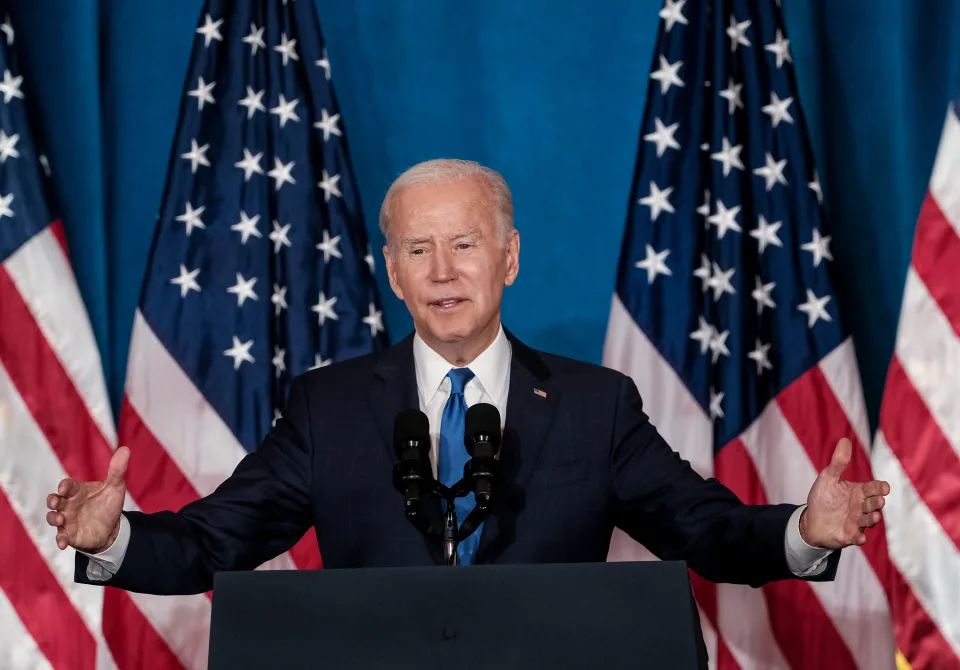
WASHINGTON — Speaking on Wednesday evening from Union Station, mere blocks from where rioters shook American democracy to its core on Jan. 6, 2021, by storming the Capitol in an attempt to overturn the previous November’s presidential contest, President Biden warned that assaults on free and fair elections were worsening, as was the incidence of political violence.
“My fellow Americans, we’re facing a defining moment, an inflection point. We must — with one, overwhelming, unified voice speak as a country and say there’s no place — no place — for voter intimidation or political violence in America,” Biden said.
He opened his remarks by acknowledging the attack late last week on Paul Pelosi, the husband of House Speaker Nancy Pelosi, a favorite nemesis of the right. Pelosi was assaulted in his San Francisco home by a disturbed suspect motivated by conspiracy theories he had encountered on the internet.
“Where’s Nancy?” the man — later identified as Paul DePape — wondered as he searched for the speaker, who was in Washington at the time. Unable to find her, he roused her husband and struck him with a hammer. Though he suffered serious injuries, Pelosi is expected to recover fully.
“Those are the very same words used by the mob when they stormed the United States Capitol on January the 6th,” Biden noted of DePape’s haunting call. Without tethering the entire Republican Party to baseless conspiracies about the 2020 election — the most persistent of which have been debunked, to no seeming effect — he argued that voting for pro-Trump candidates would amount to voting against democracy.
Democrats have used Jan. 6 as a centerpiece of their argument for why they should maintain control of Congress, depicting Republicans as untrustworthy custodians of the institutions that sustain the democratic process.
“American democracy is under attack because the defeated former president of the United States refused to accept the results of the 2020 election,” Biden said, returning to the practice of not mentioning Trump by name.
He pointed out that next Tuesday would mark “the first national election since the events of January 6th,” which were organized by supporters of President Trump in an effort to keep Congress from certifying the presidential election held on Nov. 3, 2020, which Biden won. Trump refused to accept the results, and many Republicans followed suit.
And while the scene at the Capitol on Jan. 6 was unruly, the plan to subvert the democratic process involved the highest levels of government, conscripting a broad array of Trump supporters, from Supreme Court Justice Clarence Thomas to far-right militant Stewart Rhodes of the Oath Keepers, who is now on trial along with several accomplices.
“I wish I could say the assault on our democracy ended that day,” Biden said. “But I cannot.”
Increasingly, election conspiracy theories are becoming part of the political mainstream, making it more and more difficult to distinguish reality from fiction. In his speech, Biden asked Americans to keep those considerations in mind as they cast their votes.
“Extreme MAGA Republicans aim to question not only the legitimacy of past elections, but elections being held now and into the future,” he said, using a favorite epithet for pro-Trump candidates. One analysis has found that there are 249 GOP candidates across the country who have engaged in election denialism.
“That is the path to chaos in America,” Biden warned. “It’s unprecedented, it’s unlawful and it’s un-American.”
Wednesday’s address was billed as a Democratic National Committee event; the speech was intended to bolster Democratic candidates across the country, not all of whom, of course, are facing off against election deniers — but who, on the whole, have struggled to find the kind of coherent argument that powered Democratic midterm gains in 2018, thanks to disciplined messaging on healthcare.
In the days after Jan. 6, as images of violent chaos and purposeless destruction dominated cable news and social media, there was hope that Trump’s false claim to victory in the presidential election would finally loosen its grip on the Republican Party — and that, perhaps, the Trumpian fever would break.
Such hopes were quickly dashed. Even as he retired to Florida, stripped of his social media accounts and condemned by a few members of his own party, Trump continued to exert immense sway over the GOP.
Biden sought to remind voters of their own agency — urging them to vote for Democrats without quite saying so outright. “You have the power,” he said. “It’s your choice. It’s your decision. The fate of the nation, the fate of the soul of America, lies where it always does — with the people, in your hands, in your heart, in your ballot.”
The speech was partly written by prominent historian Jon Meacham, who has advised Biden in the past, Politico reported. In some ways, the address echoed the one Biden gave from Philadelphia in September, when he denounced Trump-aligned Republicans as political saboteurs.
But as much as the president clearly had his own political party’s prospects in mind, he aspired to an appeal beyond partisanship. “This is not about me,” the president said. “It’s about all of us.”
The Federal Inland Revenue Service (FIRS) has begun its recruitment exercise for experienced professionals to…
Primate Elijah Ayodele Unveils 94-Page Prophecy for 2025, Makes Striking Predictions About Nigeria’s Political and…
The Senior Special Assistant to President Bola Tinubu on Community Engagement (North Central), Abiodun Essiet,…
The Minister of Information and National Orientation, Mohammed Idris, has warned politicians against linking stampedes…
Tobi Adegboyega, founder of the Salvation Proclaimers Anointed Church (SPAC Nation), has stated that he…
The Independent Petroleum Marketers Association of Nigeria has said that petrol is going to sell…